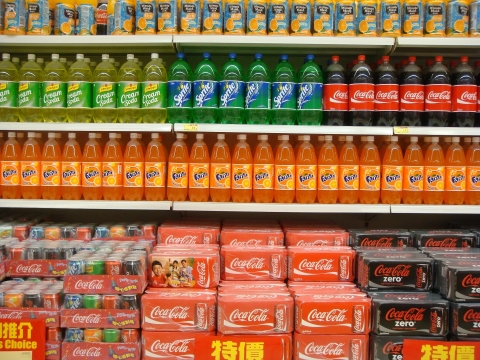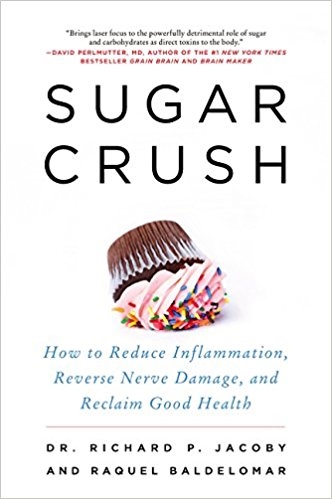You may think high fructose corn syrup is the worst thing since the invention of the atomic bomb or the best thing since we discovered the wheel.
Either way, I wanted to put on my minor’s cap and dig deep to get at the truth about high fructose corn syrup. I figure that’s the only way I can make intelligent dietary decisions for my family. I believe the truth matters and you probably feel the same way.
Unfortunately, facts are sometimes difficult to find. One scientist says one thing as a fact and another scientist turns right around and contradicts that supposed fact. Who do you believe? Which one is telling you the truth? Maybe both are telling a small part of the truth. Who knows?
On the topic of high fructose corn syrup, there are way more myths and half-truths than facts rolling around out there in cyberspace. It is my hope that you will benefit by me sharing my research with you.
Is fructose bad for you? True or False
True and False. If you happen to be one of those unfortunate folks that have fructose intolerance, it’s bad for you. Fortunately, most of us are not fructose intolerant. (5)
For the rest of us, it’s too much fructose that’s bad for us. Fructose is a sugar found in all fruit and many vegetables. (6)
Fructose is metabolized in the liver. Thank you, Mr. liver, for doing such an outstanding job for us. (2, 10, 11)
Our livers do an excellent job for us if we don’t overload them. Think about it this way. On a sweltering day, you pour yourself a nice tall glass of water. It’s delicious and good for you. However, if you drink too much water, your body’s electrolytes get off balance. This results in the cells in your body taking on water. Too much water and you might just die.
Actually, that very thing has happened to more than one person. Too much of anything isn’t good for you. It overtaxes that amazing process your body uses to metabolize food.
That is true of any food or beverage you consume including fructose, sucrose, and all sugars.
When it comes to sugars, fructose included, we consume way more than we should. The big question is why? (2)
Sugar is cheap, it’s legal, and it’s addictive (it stimulates the same pleasure centers in the brain as heroin and cocaine). (7)
Is high fructose corn syrup bad for you? True or False
False.
Sugar Crush: How to Reduce Inflammation, Reverse Nerve Damage, and Reclaim Good Health
The fructose in high fructose corn syrup is chemically identical to that found in an apple or pear. However, there two differences between high fructose corn syrup and cane or beet sugar. 1. High fructose corn syrup contains water and cane/beet sugar doesn’t. 2. High fructose corn syrup doesn’t chemically bond its sucrose and fructose molecules together and cane/beet sugar does. (1)
This bonding has raised concerned among some experts arguing that since there is no bonding with high fructose corn syrup can upset the sugar balance. There is no evidence to support that theory since the bonding in cane/beet sugar is broken down quickly in the stomach and gut once it is consumed.
Is there more fructose in high fructose corn syrup than in fruit?
High fructose corn syrup is manufactured in varying concentrations of fructose 42%, 55%, 65%, and 90%. (You might be interested to know that agave, touted as the “healthy” sweetener can have a fructose concentration ranging from 55% to 97%. Did someone say this is a healthier alternative?
You will read in some places online that the FDA limits the amount of fructose in soft drinks to 55%. That is not true.
55% appears to be the recommended concentration. Tests done on beverages you buy in your local supermarket tested at 55% (8), but you can see for yourself the percentage of HFCS in Coca-Cola products are at 65% when they are dispensed vs sold in a bottle or can. If you check out the link and follow the Coca-Cola video, you can clearly see the concentration of high fructose corn syrup they are using in their equipment. (9)
How do I know that 43% or 55% are only FDA recommendations? I looked it up. Here’s what the FDA says about fructose. And this, my friends, is exactly why it’s perfectly legal for Coca-Cola to use high fructose corn syrup at 65% fructose.
What does all this mean?
Let’s say the manufacturer of a soft drink is adding high fructose corn syrup at a concentration of 55 percent. This is roughly the same fructose to sucrose ratio as an apple.
However, one medium-sized apple has about 19 grams of sugar in total; this includes 8.5 grams of fructose plus potassium, fiber, vitamin A, vitamin C, iron, vitamin B6, and magnesium.
Now let’s say you wanted to match that amount of fructose in the apple with a soft drink at 55% fructose. You would only be drinking 4 ½ ounces of a soft drink to give you about the same amount of fructose and water as in the apple, plus zero anything else.
Now let’s look at another example. Let’s say you are trying to decide whether to drink a 12-ounce serving of apple juice or a 12-ounce soft drink. (4)
The 12-oz. apple juice will contain roughly 39 grams of total sugar, 19 1/2 grams of the sugar is fructose, plus vitamin C, iron, magnesium, and potassium.
12 ounce Dr Pepper – total sugar 41 grams
- 22.55 grams of fructose at 55% plus zero nutrients
- 26.65 grams of fructose at 65% plus zero nutrients
12 ounce Coke – total sugar 40 grams
- 22 grams of fructose at 55% plus zero nutrients
- 26 grams of fructose at 65% plus zero nutrients
It is clear that all three of the beverages are high in sugar, but the sodas lack the nutritional value of the fruit or juice.
Will high fructose corn syrup make me fat? True or False
True and false. The American consumption of sugar in all its forms is high in the United States. As I stated above, fructose metabolizes differently than sucrose.
Despite all the horror stories and hype about fructose and HFCS making us fat, contributing to metabolic disease, and other horrors including it containing Mercury (debunked) (4), there are no studies producing a direct link to either fructose or HFCS to the stories. (10, 11) The studies performed as of this date give mixed results.
Summing it up
If you’re like I am, you probably eat and drink way too much sugar than what’s good for you. Now we know why it’s addictive because it tickles the pleasure centers in our brain. The more sugar we consume, the more we want.
We’ve demystified the fructose issue and have determined that high fructose corn syrup isn’t the demon many of us thought it was. Over consumption of sugar in all its forms just like the over consumption of anything else is where the problem rests.
Now go out there and have a glass of water and relax.
You may also be interested in the following posts:
Vitamin Facts – Shhh It’s a Secret
References:
- https://www.fda.gov/food/ingredientspackaginglabeling/foodadditivesingredients/ucm324856.htm
- http://www.nytimes.com/2006/07/02/business/yourmoney/02syrup.html
- http://www.huffingtonpost.com/dr-mark-hyman/high-fructose-corn-syrup_b_4256220.html
- https://corn.org/hfcs-mercury/
- http://whole9life.com/2011/11/fructose-foolishness/
- https://www.uwhealth.org/healthfacts/nutrition/376.pdf
- https://www.youtube.com/watch?v=UgIinh1N_tE
- https://www.princeton.edu/news/2008/12/10/sugar-can-be-addictive-princeton-scientist-says
- https://www.ncbi.nlm.nih.gov/pmc/articles/PMC4285619/
- https://www.cokesolutions.com/coca-cola-freestyle/articles/coca-cola-freestyle-care-and-maintenance-videos
- https://www.ncbi.nlm.nih.gov/pubmed/23493540
- https://www.ncbi.nlm.nih.gov/pubmed/26178027


